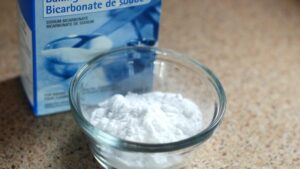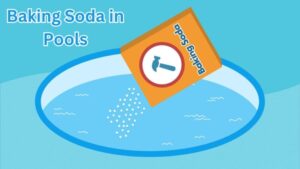Swimming pools are the staple of summer fun, but that shimmering aquatic playground requires a significant amount of maintenance. One widely discussed method of optimal pool upkeep is the use of baking soda in pools. Is it the miracle substance it’s often made out to be, or is there more to the story? This post seeks to answer that question, with the aim of demystifying the role baking soda plays in the overall health and maintenance of your pool.
What’s the Deal with Baking Soda in Pools?
Baking soda, also known as sodium bicarbonate, is often touted as an affordable and effective solution for maintaining water balance in swimming pools. It’s crucial for keeping the pool water clear and safe, but how does it achieve this? This is where things such as pool alkalinity and pH levels come into play.
Baking Soda’s Role in Raising Pool Alkalinity
Simply put, alkalinity refers to the ability of water to neutralize acids. Essentially, it acts as a buffer, preventing any sudden changes in pH levels, which could be harmful to pools and their users. Baking soda is known to raise alkalinity in pools, thus contributing to the overall water balance. By maintaining alkalinity, baking soda helps to stabilize the pH levels, leading to less frequent need for pool maintenance and potential cost savings.
How Baking Soda Impacts Pool pH Levels
The pH level represents how acidic or alkaline the pool water is. A lower pH means more acidic water, while a higher pH signifies more alkaline or basic water. Stable pH levels are vital for ensuring the effectiveness of chlorine, the primary disinfectant for pools. If the pH levels are fluctuating, it can reduce chlorine’s effectiveness, causing cloudy water and possible skin irritation. Baking soda, thanks to its alkaline nature, can raise the pH levels in your pool, ensuring your water is neither too acidic nor too basic.
Determining the Perfect Amount of Baking Soda for Your Pool

The question that often arises is, how much baking soda should you put in your pool? The precise amount largely depends on the size of the pool and the existing chemical balance, but as a rule of thumb, you’ll want to add 1.5 lbs. of baking soda per 10,000 gallons of water to increase the total alkalinity by 10 ppm.
Weighing the Pros and Cons: Is Baking Soda Good for Pools?
Before you start pouring in boxes of baking soda, it’s worth considering the pros and cons. Is baking soda good to use in a swimming pool? When used correctly, baking soda can indeed work wonders in maintaining water balance, clarity, and overall health. However, excessive use can potentially cause the pH levels to rise too high, leading to cloudy water and scaling.
Examining the Frequency of Baking Soda Addition to Pools
Another question that looms potential baking soda users: how often should I add baking soda to my pool? There’s no one-size-fits-all answer, as the frequency mostly depends on the usage of the pool, the chemical balance, and other aspects like rainfall and temperature. It’s sensible to test the water frequently and add baking soda when needed to balance the water chemistry.
Can Baking Soda and Chlorine Go Hand-in-Hand?
Are you wondering if you can add baking soda and chlorine to your pool at the same time? The answer is positive, but with caution. While baking soda can effectively regulate pH and alkalinity levels, it doesn’t work as a disinfectant. That’s where chlorine plays its part. It’s crucial, however, to wait until the baking soda has fully dissolved and mixed before adding chlorine to prevent unnecessary chemical reactions.
Baking Soda vs. Alkalinity Increaser: Which Reigns Superior?
Looking for the cheapest way to shock a pool or wondering if baking soda is better than an alkalinity increaser? Cost-wise, baking soda is typically cheaper. It can essentially perform the same function as an alkalinity increaser, but it might require more baking soda than a specialized product.
Conclusion
In summation, baking soda serves as an affordable and effective solution for maintaining water chemistry balance in swimming pools. It raises alkalinity and pH levels, offers cost-saving benefits, and can be combining with chlorine for comprehensive pool maintenance. However, it should be used judiciously, keeping in mind the specific needs of your pool, to ensure a healthy, clean, and sparkling swim all summer long.
Whether you’re a pool maintenance novice or a seasoned veteran, understanding how to properly utilize baking soda in your swimming pool can lead to optimal benefits. Keep testing, keep adjusting, and keep swimming!

Greetings, fellow pool enthusiasts! I’m Turner Davis, your dedicated guide to the world of pool care and maintenance. With over a decade of experience in the field, I’ve made it my mission to transform ordinary pools into extraordinary aquatic retreats.

